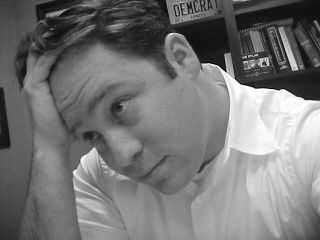From the NYTimes, I thought this should be posted in its entirety.
Vice President Dick Cheney continued to insist last week that Iraq had been trying to make weapons of mass destruction, apparently oblivious to the findings of the administration's own chief weapons inspector that Iraq had possessed only rudimentary capabilities and unrealized intentions. The vice president's myopia suggests a breathtaking unwillingness to accept a reality that conflicts with the administration's preconceived notions. This kind of rigid thinking helped propel us into an invasion without broad international support and, if Mr. Cheney is as influential as many say, could propel us into further misadventures down the road.
Mr. Cheney has long been the administration's most alarmist proponent of the view that Saddam Hussein had chemical and biological weapons ready for use at any time and an active nuclear program. He gave little ground in an interview on National Public Radio on Thursday. He described two flatbed trailers found in Iraq months ago as mobile biological weapons labs and claimed they were "conclusive evidence" of Iraqi programs to make weapons of mass destruction. The very next day, David Kay, who had just stepped down as the top weapons inspector, told Reuters that he now thought the much-feared stockpiles of biological and chemical weapons had not existed on the eve of the war. They were eliminated in the mid-1990's by United Nations inspectors and by Iraq's own decisions, he said, and no significant efforts to make new ones followed.
As for those trailers cited by Mr. Cheney, the consensus view, Mr. Kay told The Times, is that they were intended to produce hydrogen or perhaps rocket fuel, not biological weapons. Mr. Kay had earlier called the trailer assertions an embarrassing fiasco. So, too, with Iraq's nuclear weapons program. Mr. Cheney once famously declared that it had been reconstituted, but Mr. Kay called it rudimentary — hardly capable of producing a bomb in a year or two, as the administration had implied.
Although administration officials cling to the hope of finding some evidence of terror weapons in a cubbyhole somewhere in Iraq, surely it is time to focus on how the intelligence could have been so wrong and perhaps avoid making the same mistakes with the next secretive dictator to come along. Mr. Kay largely exonerates President Bush and blames the global intelligence community. He believes the C.I.A. became so reliant on the much-maligned United Nations weapons inspectors that their withdrawal left it without spies of its own.
Mr. Kay also believes that intelligence analysts failed to realize that Mr. Hussein became increasingly isolated and fantasy-driven in the late 1990's, a condition that enabled scientists to hoodwink him into approving fanciful weapons plans that turned into corrupt moneymaking schemes. That seems hard to believe in a land where people supposedly lived in terror of a brutal dictator. But if it is true that Mr. Hussein wrote novels while the American-led force geared up for war, then perhaps both sides of this conflict were divorced from reality.
Tuesday, January 27, 2004
Subscribe to:
Post Comments (Atom)

No comments:
Post a Comment